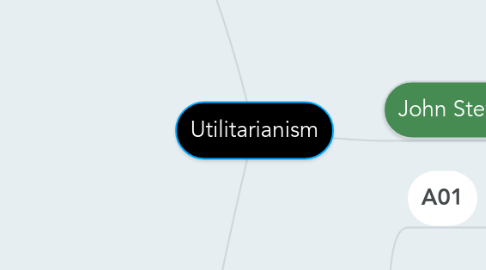
1. Jeremy Bentham
1.1. A01
1.1.1. . Aims for the greatest good, for the greatest number of people. . Wanted to propose social reform for all. . Teleological theory in which ‘good’ is that which produces pleasure. . Hedonic Calculus, produces happiness. Purity,Demoteness,Extent,Duration,Intensity,Certainty.
1.1.2. Quotes
1.1.2.1. . “...human kind is under the governance of two sovereign masters, pleasure and pain... it is for them to point how we ought to behave.” . “Quantity of pleasure being equal, push-pin is as good as poetry.”
1.2. A02
1.2.1. Strengths
1.2.1.1. . Takes into account cultural diversity. – polygamy. . Humanistic as it maximises human goals which is telos and aspires all to be happy. . Common sense dictates all situations are not identical, also discourages selfish actions.
1.2.2. Weaknesses
1.2.2.1. . Impractical as it doesn’t allow enough time to apply the calculus. . Has potential to justify many actions such as bullying and exploitation. . Pleasure takes a lot of different forms therefore we do not know pleasure itself. . People cannot be trusted as their acts may be selfish and pretending to be the ‘greater good’.
2. Peter Singer
2.1. A01
2.1.1. . People should take viewpoint of impartial spectator. . Concerned with the best interests of the individual. . Doesn’t consider what increases pleasure and diminishes pain. . Sacrificing an individual because it benefits the majority may be problematic. . When a person thinks ethically they must weigh up all of the interests of the people involved.
2.1.2. Quotes
2.1.2.1. . “According to preference utilitarianism, an action is contrary to to the preference of any being is, unless this preference is outweighed by contrary preferences, wrong. Killing a person who prefers to be living is therefore wrong, other things being equal.” . “Choose the course of action which brings the best consequences, on balance, for all affected.” . “This other version of Utilitarianism judges actions, not by their tendency to maximise pleasure or minimise pain, but by the extent to which they accord with the preference of any beings affected by the action or its consequences.”
2.2. A02
2.2.1. Strengths
2.2.1.1. . Everyone's interests are given equal consideration. . Practical and useful, for example if someone won the lottery, they would share it rather than keep it to themselves. . Easy to apply to real life situations.
2.2.2. Weaknesses
2.2.2.1. . Hedonism is wrong just because some people enjoy a certain authority. It doesn’t make that actility right, for example pornography is not right. . Its unpredictable as you might think it will help a lot of people but suddenly something could change that would mean a lot of people would not benefit. . It’s unfair on some people as it only looks at majority therefore some suffering can be caused to minority (not community happiness).
3. John Stewart Mill
3.1. A01
3.1.1. . Believed happiness, not pleasure, is standard utility. . His main assumptions were freedom and liberty. . Found fault with suppression of minorities – what is good for society is overall happiness. . PLEASURE – GRATIFICATION – PURSUED AS AN END IN ITS OWN RIGHT. . HAPPINESS – SATISIFCATION I INDIRECT BY-PRODUCT OF ANOTHER ACTIVITY. . [HIGHER PLEASURES – SATISFY MIND] . [LOWER PLEASURES – SATISFY BODY] . Eudemonistic
3.1.2. Quotes
3.1.2.1. . “It’s better to be a human being dissatisfied than a pig satisfied, better to be Socrates dissatisfied than a fool satisfied.” . Harm Princible – “the only purpose for which power can be rightfully exercised over any member of a civilised community, against his will, is to prevent harm to others.”
3.2. A02
3.2.1. Strengths
3.2.1.1. . Democratic – allows everybody to have their input in rulings for example elections. . Promotes equality for everybody. . Whole community is involved. . Rules can be changed and adapted.
3.2.2. Weaknesses
3.2.2.1. . Henry Sidgwick – How do we distinguish between higher and lower pleasures? Also are higher pleasures from another? . Elitist – not everyone can afford to experience higher pleasures. . Almost deontological, rule-based. . Higher and lower pleasures are extremely subjective.
